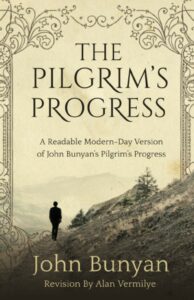
Book Summary
The Pilgrim’s Progress is a very famous book written by John Bunyan. It is a story about a man named Christian who goes on a long and adventurous journey. This book is considered a classic because it teaches important lessons about life and faith.
The Pilgrim’s Progress is a really exciting book! It starts with Christian, who is unhappy with his life and wants to find a better place called the Celestial City. He meets many interesting characters along the way, like Mr. Worldly Wiseman and Giant Despair. Christian faces many challenges and temptations, but he never gives up. He learns important lessons about being brave, kind, and staying true to his beliefs.
The Pilgrim’s Progress is an allegory, which means that the characters and events in the story represent something deeper. Christian’s journey represents a person’s journey through life, and the obstacles he faces represent the challenges we all face. This book teaches us about the importance of having faith, being kind to others, and staying true to ourselves.
John Bunyan was an English writer who lived a long time ago, in the 17th century. He wrote The Pilgrim’s Progress while he was in prison for his religious beliefs. Bunyan wanted to share his faith with others, and this book became very popular because it spoke to people’s hearts. Even though it was written a long time ago, The Pilgrim’s Progress is still loved by many people today.
“The Pilgrim’s Progress” is a timeless Christian allegory written by John Bunyan in 1678. The book is a two-part narrative that tells the story of a man named Christian, who embarks on a journey from his hometown, the “City of Destruction,” to the “Celestial City,” representing Heaven. The second part of the book follows Christian’s wife, Christiana, and their children on the same journey. The book is a profound exploration of the Christian faith and the trials and tribulations faced by believers.
“The Pilgrim’s Progress” is a compelling and insightful read. Bunyan’s vivid and imaginative storytelling brings to life the spiritual journey of the protagonist, making it relatable to readers across generations. The book’s allegorical nature allows for a deep exploration of Christian theology, morality, and spirituality. The characters Christian encounters, such as Evangelist, Hopeful, and Giant Despair, symbolize various aspects of the Christian journey, making the narrative rich and layered.
The second part of the book, featuring Christiana’s journey, adds depth to the narrative by providing a different perspective on the pilgrimage. It explores themes of repentance, grace, and perseverance, further enriching the book’s spiritual message.
Despite its religious undertones, “The Pilgrim’s Progress” is not just for the religious reader. Its exploration of human nature, morality, and the quest for a higher purpose makes it a universal tale of human struggle and resilience.
“The Pilgrim’s Progress” is a masterful piece of allegorical literature. Bunyan uses the journey motif to symbolize the Christian’s spiritual journey, with each character and event representing a specific spiritual challenge or victory. The Slough of Despond, for example, symbolizes the despair and doubt that can engulf a believer, while the character of Evangelist represents the guidance provided by the Gospel.
The book’s narrative structure, moving from one trial to another, mirrors the Christian belief in life as a continuous spiritual battle. Bunyan’s use of language is simple yet profound, making the book accessible to readers of all backgrounds.
The second part of the book, focusing on Christiana, is a significant addition to the narrative. It not only provides a female perspective on the spiritual journey but also explores the themes of community, family, and the role of women in the Christian faith.
John Bunyan (1628-1688) was an English writer and preacher. Born into a humble family, Bunyan had little formal education. However, he was a voracious reader and taught himself to write. His spiritual journey, marked by intense struggle and profound revelations, greatly influenced his writings.
Bunyan wrote “The Pilgrim’s Progress” while in prison for conducting unlicensed religious services. Despite facing persecution and hardship, Bunyan’s faith remained unshaken, a theme reflected in his writings. Today, he is remembered as one of the most significant figures in English literature, with “The Pilgrim’s Progress” being one of the most widely read books in the English language.
Don Quixote by Miguel de Cervantes
Miguel de Cervantes
Read Now →